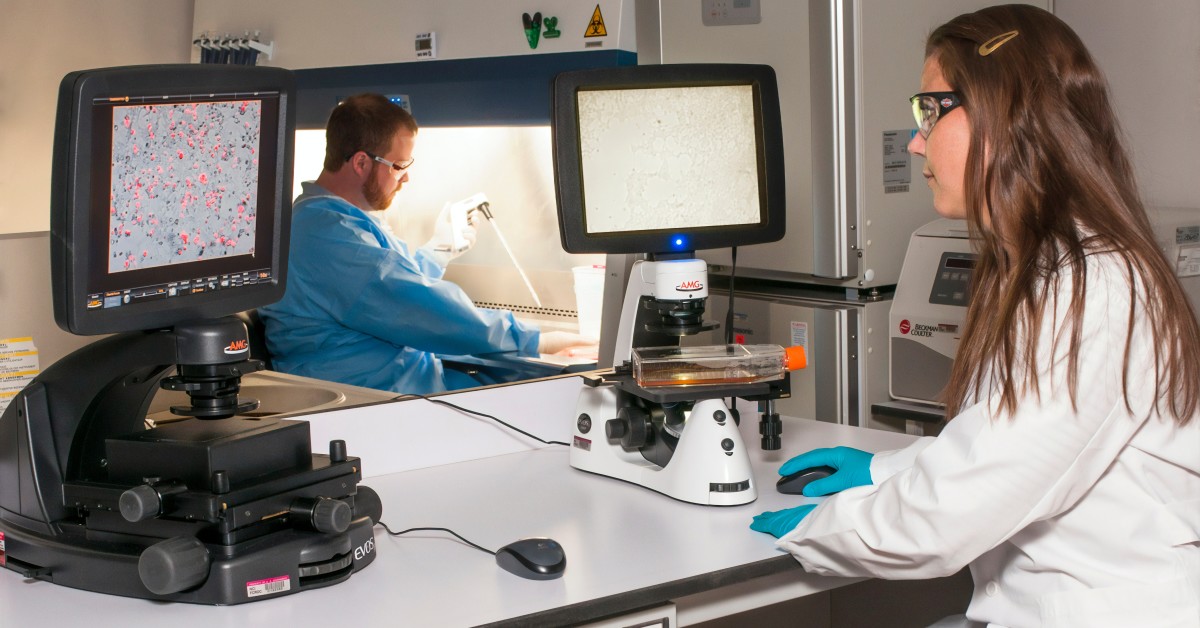
Health Informatics vs. Health Analytics [Difference Explained]
Health informatics and health analytics aren't that different,at least as [...]
![Health Informatics vs. Biomedical Informatics [Difference Explained]](https://resources.noodle.com/wp-content/uploads/2023/11/nick-morrison-FHnnjk1Yj7Y-unsplash-1024x536.jpg)
The role of informatics in medicine has grown with the evolution of computer technology, data science, and automation. Today, the branching discipline of informatics has multiple applications in patient care, electronic health records (EHR) administration, and billing. Informatics also plays a role in clinical research, driving such emerging subfields as cognitive informatics, medical signal processing, and neuroinformatics.
Health informatics is a practical discipline analogous to data science. Biomedical informatics__ can be another name for health informatics, a subdiscipline of health informatics, or an umbrella term for healthcare-focused informatics that includes everything from clinical informatics to public health informatics.
Confused yet? You’re not the only one. Colleges and universities, employers, and informaticians have varying ideas about how these disciplines differ—or don’t.
That makes choosing between health informatics and biomedical informatics degree programs tricky. The Master of Science in Health Informatics (MSHI) at one school may cover the same ground as the Master of Science in Biomedical Informatics (MScBI) at another. A third school may offer both an MSHI and an MScBI—and both degrees can lead to a range of careers in analytics and information science.
Making the right decision requires looking closely at informatics master’s degree programs and discerning how employers distinguish between health informatics and biomedical informatics. That’s what we’ve done in this article about health informatics vs. biomedical informatics, which covers:
There’s no definitive answer to this question. Health informatics is often described as the discipline at the intersection of medical records keeping and data science, but that description is too limiting. Informatics encompasses everything in the healthcare business involving information and computing. The field generates billions of gigabytes of information each year related to everything from patient care to medical device research to treatment outcomes; informatics is the discipline that deals with all that data. Health informatics applications are varied, but they’re generally used to make healthcare delivery better, improve patient outcomes, ensure new drugs and devices are safe and help medical facilities operate more efficiently.
Some sources treat health informatics and biomedical informatics as one discipline. The American Medical Informatics Association, for instance, defines biomedical informatics as “the interdisciplinary field that studies and pursues the effective uses of biomedical data, information, and knowledge for scientific inquiry, problem solving and decision making, motivated by efforts to improve human health.” Dr. William Hersh, professor of medical informatics at Oregon Health & Science University asserts that biomedical and health informatics (BMHI) should be used to refer to all fields concerned with the “optimal use of information, often aided by the use of technology, to improve individual health, healthcare, public health, and biomedical research.”
Others treat biomedical informatics as a subdiscipline of informatics concerned specifically with biological data derived from patient populations or even individual patients. According to one paper, “Biomedical informatics is the science of information as applied to or studied in the context of biomedicine.” Some professionals who identify as biomedical informaticists help doctors develop personalized treatments, reduce healthcare costs, and streamline care delivery using individual patients’ biological data. However, others use data and information systems to guide decisions related to care delivery in certain healthcare environments—just like health informaticists.
The bottom line is that there’s not yet a conclusive distinction between health informatics and biomedical informatics as disciplines. Still, you’ll see some differences as you research master’s degree programs, especially when it comes to these programs’ content.
Biomedical informatics programs are often, though not always, more advanced than health informatics programs. It’s telling that quite a few biomedical informatics master’s programs prefer, or even require, that applicants already have a doctoral degree or an advanced clinical degree—or, like Harvard University’s biomedical informatics program, are offered by the medical school.
Students in health informatics master’s programs take core classes covering topics like data analytics, health information management, EMR systems, and IT in healthcare.
The online MS in Health Informatics curriculum at the University of Pittsburgh‘s School of Health and Rehabilitation Sciences, for example, includes classes like:
UPitt’s master’s in health informatics program is clearly designed for students who intend to work on the business side of healthcare delivery.
There’s no “typical” master’s in biomedical informatics curriculum because this is a research-focused degree pathway at some schools and a professional degree pathway at others. In Stanford University’s MS in Biomedical Informatics program, for instance, students devote more than 50 percent of their time to research. Others prioritize coursework over research. And some, like Harvard University’s program, have multiple tracks for students from different backgrounds.
At UPitt, students complete original research plus 18 credits of core coursework and 14 credits of electives, including classes like:
In health informatics, a master’s degree is usually all it takes to advance because the discipline has many practical applications. You won’t need a doctoral degree unless you want to work in academia or research. Biomedical informatics, meanwhile, can be a research-intensive field, and if you choose it, chances are you’ll be competing for open positions against peers with doctorates.
Biomedical informatics is a concentration option in some MSHI programs, and health informatics is a concentration option in some biomedical information master’s programs. The takeaway is that you shouldn’t rely on degree names or concentration names alone when assessing programs. Always read course lists carefully.
Specialization tracks in health informatics master’s programs include:
Many biomedical informatics master’s programs don’t offer set concentration options because curricula are built around student research. Schools with fixed curricula may offer specializations like:
Traditionally, master’s degree programs have taken about two years of full-time study to complete. However, many graduate-level programs today are shorter or are designed to be completed in two years of part-time study.
Most MSHI programs last about two years but are designed to meet the needs of working professionals. There are, however, faster options. Johns Hopkins University and the University of North Carolina at Chapel Hill both offer master’s degrees in health informatics that can be completed in one year.
You can earn a master’s in biomedical informatics in one-and-a-half to two years at most schools. Unlike most other informatics programs, however, MS in Biomedical Information programs may not be designed around working professionals’ needs. Students in research-intensive programs are expected to commit fully to their studies and projects for the duration of their programs.
There’s no one standout school for either health or biomedical informatics, though many highly ranked colleges and universities offer informatics master’s degrees.
There are highly respected MSHI programs at:
There are strong dedicated biomedical informatics programs at:
–Columbia University
Keep in mind, however, that the best biomedical informatics master’s program for you may be an MSHI with a biomedical informatics concentration.
Many schools have replicated their on-campus health informatics degree programs online. Fewer offer biomedical informatics master’s for distance learners.
These colleges and universities have some of the strongest online health informatics master’s programs:
Schools with strong online biomedical informatics master’s programs include:
The cost of a master’s degree usually varies more from school to school than from program to program.
You’ll probably pay between $20,000 and $30,000 for a health informatics master’s degree—not including fees, the cost of materials, and other expenses. Expect to pay more if you’re accepted into a program at a prestigious college or university, however. Graduate tuition at Stanford University, for instance, is more than $18,000 per quarter for full-time students.
Professional master’s programs in biomedical informatics don’t usually cost more or less than other graduate degree programs at comparable universities. Students in research-focused academic programs, however, may receive partial or full funding through their departments.
The outlook for tech-focused jobs in healthcare is excellent because the field generates so much data, and the applications of computation in medicine are expanding.
The US Bureau of Labor Statistics (BLS) predicts jobs for medical records and health information technicians will grow more than twice as quickly as jobs in other fields. You’ll likely enjoy lifelong job stability if you’re flexible about titles and you stay current with tech changes.
Determining the outlook for careers in biomedical informatics is tough because many employers use the terms health informatics and biomedical informatics interchangeably. It’s probably safe to assume, however, the outlook for biomedical informatics jobs is similar to other informatics jobs.
Informatics professionals work for healthcare networks, medical practices, insurance companies, research labs, and public health organizations.
MSHI graduates often have titles like:
MScBMI graduates can do all of the above jobs and jobs that specifically call for biomedical informatics specialists, like:
Roles in health informatics that pay the most include:
Again, the best-paying jobs for biomedical informatics master’s holders are the same as those listed above. You might become a director of biomedical informatics or a senior biomedical informatics research specialist, but it’s equally likely you’ll become an informatics director or senior informatics research specialist.
Informatics is a complex field that will likely only grow more complex and segmented in the future—in which case biomedical informatics may become a distinct discipline focused exclusively on utilizing patient data. For now, however, there are only a handful of colleges and universities that draw a distinction between health informatics vs. biomedical informatics. That distinction is often driven by whether students will go on to work in healthcare or academia.
If you want to work in medicine, pharmaceuticals, or public health doing data analytics, information management, or health IT, you’ll get the skills, knowledge, and qualifications you’ll need in an MSHI program. On the other hand, if you want to work in research tackling big questions related to AI and the brain, or do things related to unraveling the insights locked in one patient’s genome, a research-focused biomedical informatics master’s program is the better choice.
(Last Updated on February 26, 2024)
Questions or feedback? Email editor@noodle.com

Health informatics and health analytics aren't that different,at least as [...]

Health informatics is sometimes called biomedical informatics, which sounds a [...]

Informatics and health information management are related healthcare disciplines that [...]

You can't have health informatics without support from health IT. [...]

Nursing informatics is a subdiscipline of informatics that deals exclusively [...]
Categorized as: Health Informatics & Sciences, Nursing & Healthcare